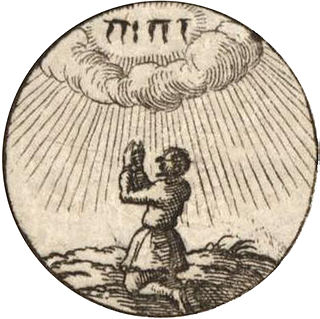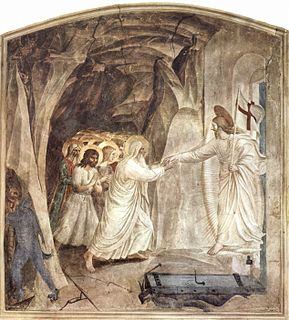Catholic doctrine may refer to:
Catholic doctrine may refer to:

The Immaculate Conception is a doctrine of the Roman Catholic church that states that the Virgin Mary was free of original sin from the moment of her conception. First debated by medieval theologians, it proved so controversial that it did not become part of official Catholic teaching until 1854, when Pius IX gave it the status of dogma in the papal bull Ineffabilis Deus. Protestants rejected Ineffabilis Deus as an exercise in papal power and the doctrine itself as without foundation in Scripture, and although Eastern Orthodoxy reveres Mary in its liturgy, Patriarch Anthimus VII of Constantinople characterized the dogmas of the Immaculate Conception and papal infallibility as "Roman novelties". The iconography of the Virgin of the Immaculate Conception shows her standing, with arms outstretched or hands clasped in prayer, and her feast day is 8 December.
Sola scriptura, meaning by scripture alone, is a Christian theological doctrine held by some Protestant Christian denominations, in particular the Lutheran and Reformed traditions of Protestantism, that posits the Bible as the sole infallible source of authority for Christian faith and practice.

The universal priesthood or the priesthood of all believers is a principle in some branches of Christianity which abrogates the doctrine of holy orders found in some other branches, including the Roman Catholic and Eastern Orthodox. Derived from the Bible and elaborated in the theology of Martin Luther and John Calvin, the principle became prominent as a tenet of Protestant Christian doctrine, though the exact meaning of the belief and its implications vary widely among denominations.

In Western Christian theology, grace is the help given to us by God because God desires us to have it, not necessarily because of anything we have done to earn it. It is understood by Christians to be a spontaneous gift from God to people – "generous, free and totally unexpected and undeserved" – that takes the form of divine favor, love, clemency, and a share in the divine life of God.
Orthodoxy is adherence to correct or accepted creeds, especially in religion.

Christian Church is an ecclesiological term referring to what different Christian denominations conceive of as being the true body of Christians or the original institution established by Jesus. It has been used in academia as a synonym for Christianity as well.
The five solae of the Protestant Reformation are a foundational set of Christian theological principles held by theologians and clergy to be central to the doctrines of justification and salvation as taught by the Reformed and Lutheran branches of Protestantism and Pentecostalism. Each sola represents a key belief in these Protestant traditions in contradistinction to the theological doctrine of the Catholic Church, although they were not assembled as a theological unit until the 20th century. The Reformers are known to have only clearly stated two of the five solae. Even today there are differences as to what constitutes the solae and how many there are, not to mention how to interpret them to reflect the Reformers' beliefs.

The following outline is provided as an overview of and topical guide to Christian theology:

In Christian theology, justification is God's righteous act of removing the condemnation, guilt, and penalty of sin, by grace, while, at the same time, declaring the unrighteous to be righteous, through faith in Christ's atoning sacrifice.
Apostolic may refer to:
The infallibility of the Church is the belief that the Holy Spirit preserves the Christian Church from errors that would contradict its essential doctrines. It is related to, but not the same as, indefectibility, that is, "she remains and will remain the Institution of Salvation, founded by Christ, until the end of the world." The doctrine of infallibility is premised on the authority Jesus granted to the apostles to "bind and loose" and in particular the promises to Peter in regard to papal infallibility.
Conservative Christianity or Christian conservative may refer to:
Dogmatic theology is that part of theology dealing with the theoretical truths of faith concerning God and God's works, especially the official theology recognized by an organized Church body, such as the Roman Catholic Church, Dutch Reformed Church, etc. At times, apologetics or fundamental theology is called "general dogmatic theology", dogmatic theology proper being distinguished from it as "special dogmatic theology". In present-day use, however, apologetics is no longer treated as part of dogmatic theology but has attained the rank of an independent science, being generally regarded as the introduction to and foundation of dogmatic theology.

Anglican doctrine is the body of Christian teachings used to guide the religious and moral practices of Anglicans.

Catholic moral theology is a major category of doctrine in the Catholic Church, equivalent to a religious ethics. Moral theology encompasses Catholic social teaching, Catholic medical ethics, sexual ethics, and various doctrines on individual moral virtue and moral theory. It can be distinguished as dealing with "how one is to act", in contrast to dogmatic theology which proposes "what one is to believe".

Catholic theology is the understanding of Catholic doctrine or teachings, and results from the studies of theologians. It is based on canonical scripture, and sacred tradition, as interpreted authoritatively by the magisterium of the Catholic Church. This article serves as an introduction to various topics in Catholic theology, with links to where fuller coverage is found.

A dogma of the Catholic Church is defined as "a truth revealed by God, which the magisterium of the Church declared as binding." The Catechism of the Catholic Church states:
The Church's Magisterium asserts that it exercises the authority it holds from Christ to the fullest extent when it defines dogmas, that is, when it proposes, in a form obliging Catholics to an irrevocable adherence of faith, truths contained in divine Revelation or also when it proposes, in a definitive way, truths having a necessary connection with these.

Sin is an immoral act considered to be a transgression of divine law. The doctrine of sin is central to Christianity, since its basic message is about redemption in Christ.

Gerhard Ludwig Müller is a German cardinal of the Catholic Church. He served as the Prefect of the Congregation for the Doctrine of the Faith (CDF) from his appointment by Pope Benedict XVI in 2012 until 2017. He was elevated to the rank of cardinal in 2014.
Sola gratia, meaning by grace alone, is a Christian theological doctrine held by some Protestant Christian denominations, in particular the Lutheran and Reformed traditions of Protestantism, propounded to summarise the Protestant Reformers' basic soteriology during the Reformation. It is one of the five solae and consists in the belief that salvation comes by divine grace or "unmerited favor" only, not as something merited by the sinner.